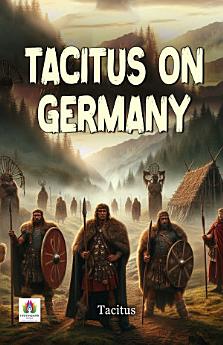Tacitus on Germany
Über dieses E-Book
In this compelling text, Tacitus presents a detailed description of the tribes, their warrior culture, and the fierce independence that characterized their way of life. He delves into the customs and beliefs of these tribes, articulating their values and the communal bond that held them together. The author’s keen eye for detail paints a vivid picture of the natural environment in which these tribes thrived, offering insights into their relationship with the land, resources, and each other. Through Tacitus's narrative, we witness how geography influenced not only their lifestyle but also their political organization and interactions with neighboring cultures.
One of the salient features of Tacitus on Germany is its critical examination of the Germanic peoples’ militaristic societies. Tacitus provides astute reflections on their valor and martial prowess, contrasting their lives with the decadence he perceived in Roman culture. Through this contrast, Tacitus makes a compelling argument that the perceived toughness of the tribes—marked by their fierce loyalty and communal values—stood in stark opposition to what he viewed as the moral decline of Rome. His analysis serves not only as a record of history but also as a commentary on the nature of civilization itself, questioning what it means to be cultured or civilized in the context of different societies.
Moreover, Tacitus’s work transcends mere historiography, engaging with themes of cultural identity and the understanding of ‘the other’. His explorations resonate through time, prompting readers to reflect on the complexities of cultural interactions and the legacy of imperialism. The way he portrays the Germanic tribes—simultaneously admiring their strength yet cautioning against their barbarity—opens up a rich discussion about the lenses through which cultures are viewed and valued. Tacitus’s method of comparative analysis invites readers to draw parallels, leading to deeper insights into human societies, their conflicts, and their collaborations.
This scholarly work has implications beyond its immediate historical context. It serves as a touchstone for understanding the evolution of cultural identity and the dynamics of power among ancient civilizations. As readers immerse themselves in Tacitus’s observations, they gain not only knowledge of a specific time and place but also a framework for thinking critically about modern societies' constructions of cultural identity and history.
With its meticulous scholarship and engaging narrative, Tacitus on Germany remains essential reading for students, historians, and anyone interested in the intricate tapestry of human civilization. Tacitus's legacy as a historian is solidified in this work, as he has paved the way for future generations to examine the richness of cultural diversity and the complexities of human interaction across time. In embracing both the beauty and brutality of life along the edges of the Roman Empire, Tacitus offers insights that are as relevant today as they were in antiquity. This text is not only a historical document but also an exploration into the very essence of what it means to belong to a culture, making it a timeless classic that continues to inspire curiosity and critical thought.








